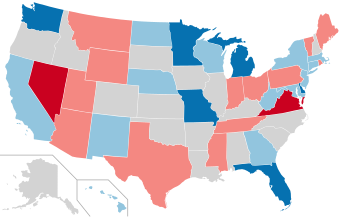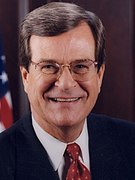
Back ھەڵبژاردنی ئەنجومەنی پیرانی ئەمریکا (٢٠٠٠) CKB Wahlen zum Senat der Vereinigten Staaten 2000 German Εκλογές της Γερουσίας των Ηνωμένων Πολιτειών 2000 Greek Élections sénatoriales américaines de 2000 French 2000년 미국 상원의원 선거 Korean
| ||||||||||||||||||||||||||||||||||||||||
34 of the 100 seats in the United States Senate 51[a] seats needed for a majority | ||||||||||||||||||||||||||||||||||||||||
|---|---|---|---|---|---|---|---|---|---|---|---|---|---|---|---|---|---|---|---|---|---|---|---|---|---|---|---|---|---|---|---|---|---|---|---|---|---|---|---|---|
| ||||||||||||||||||||||||||||||||||||||||
 Results of the elections: Democratic gain Democratic hold Republican gain Republican hold No election | ||||||||||||||||||||||||||||||||||||||||
| ||||||||||||||||||||||||||||||||||||||||
The 2000 United States Senate elections were held on November 7, 2000. The elections coincided with other federal and state elections, including the presidential election which was won by Republican George W. Bush. These elections took place 6 years after Republicans had won a net gain of eight seats in Senate Class 1. Despite George W. Bush's victory in the presidential election, the Republicans lost four senate seats, the most a winning president's party has lost since the passage of the 17th Amendment. This election marked the first election year since 1990 where Democrats made net gains in the Senate. Democrats defeated incumbent Republicans in Delaware, Michigan, Minnesota, Missouri, and Washington, and they won an open Republican-held seat in Florida. In Missouri, the winner was elected posthumously. The Republicans defeated Democratic incumbent Chuck Robb in Virginia, and won an open seat in Nevada. Additionally, Republican Senator Paul Coverdell of Georgia died earlier in the year and was replaced by Democratic appointee Zell Miller, who then went on to win the special election.
These elections resulted in an equal 50–50 split between Republicans and Democrats, with the Vice President casting the tie-breaking votes in the Senate. This was the second tied Senate, after the results in the 1880 elections. Democrats thereby won control of the Senate briefly for only 17 days, since Al Gore was still Vice President and hense still President of the Senate at the beginning of the new term on January 3, 2001. The Republicans regained control of the chamber when the new Vice President Dick Cheney was inaugurated on January 20. However, the Republican majority would only last until June 6, 2001, when Republican Senator Jim Jeffords of Vermont became an independent and caucused with the Democrats.
Until 2020, this was the last time that Democrats would win a Senate seat in Georgia. This is the last election cycle with only Republicans and Democrats in the Senate, and the last election cycle in which Republicans won seats in Rhode Island and Vermont.
Cite error: There are <ref group=lower-alpha> tags or {{efn}} templates on this page, but the references will not show without a {{reflist|group=lower-alpha}} template or {{notelist}} template (see the help page).

